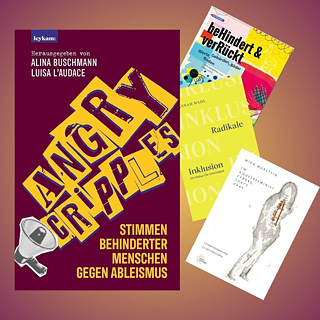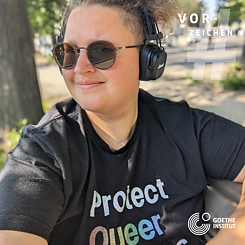Book review #3
Charlott reads 'Angry Cripples'
Charlott discusses the anthology Angry Cripples: Stimmen Behinderter Menschen Gegen Ableismus gelesen in her first book review for #Vorzeichen. There are plenty of good reasons for people with disabilities to be angry, and far too often, they and their concerns remain unacknowledged.
“We’re not going to start a revolution quietly; quiet won’t win a protest!” Alina Buschmann and Luisa L’Audace write in the prologue to Angry Cripples: Stimmen Behinderter Menschen Gegen Ableismus [Angry Cripples: People with Disabilities Speak Out Against Ableism]. As the title of the book makes plain, there are plenty of good reasons for people with disabilities to be angry, and far too often, they and their concerns remain unacknowledged.
The artists and authors in this anthology live with various disabilities (as well as different experiences of marginalization). Their work provides a complex picture of the lived realities of people with disabilities—expanded through a series of quotes from further contributors in the middle section of the book that suggests only a snippet can ever truly be depicted. The anthology centers concrete narratives: prenatal diagnostics from the perspective of a person with Down’s syndrome, internalized ableism, the climate movement, the role of an influencer with disabilities, the specific loneliness of a person with disabilities who is also the mother of a child with disabilities.
There is variety in the formal presentation of the anthology’s material, too: from essays to interviews to visual art. This not only makes reading the book a distinct experience, it also provides both authors and readers a diversity of access. Numerous examples demonstrate how authors with disabilities are at the forefront of rethinking the accessibility of books. There is a summary of Hannah Wahl’s Radikale Inklusion [Radical Inclusion] provided in simple language. The collection beHindert & verRückt [disAbled & inSane] (edited by Eliah Lüthi) includes audio files and videos with texts in sign language. Mika Murstein’s I’m a Queer Feminist Cyborg, That’s Okay pays particular attention to typography and large font. Together with these other books, the anthology Angry Cripples explores compelling approaches to a manifold reading experience far beyond the (fundamentally ableist) online discourse that “audiobooks aren’t real reading.”
The artists and authors in this anthology live with various disabilities (as well as different experiences of marginalization). Their work provides a complex picture of the lived realities of people with disabilities—expanded through a series of quotes from further contributors in the middle section of the book that suggests only a snippet can ever truly be depicted. The anthology centers concrete narratives: prenatal diagnostics from the perspective of a person with Down’s syndrome, internalized ableism, the climate movement, the role of an influencer with disabilities, the specific loneliness of a person with disabilities who is also the mother of a child with disabilities.



